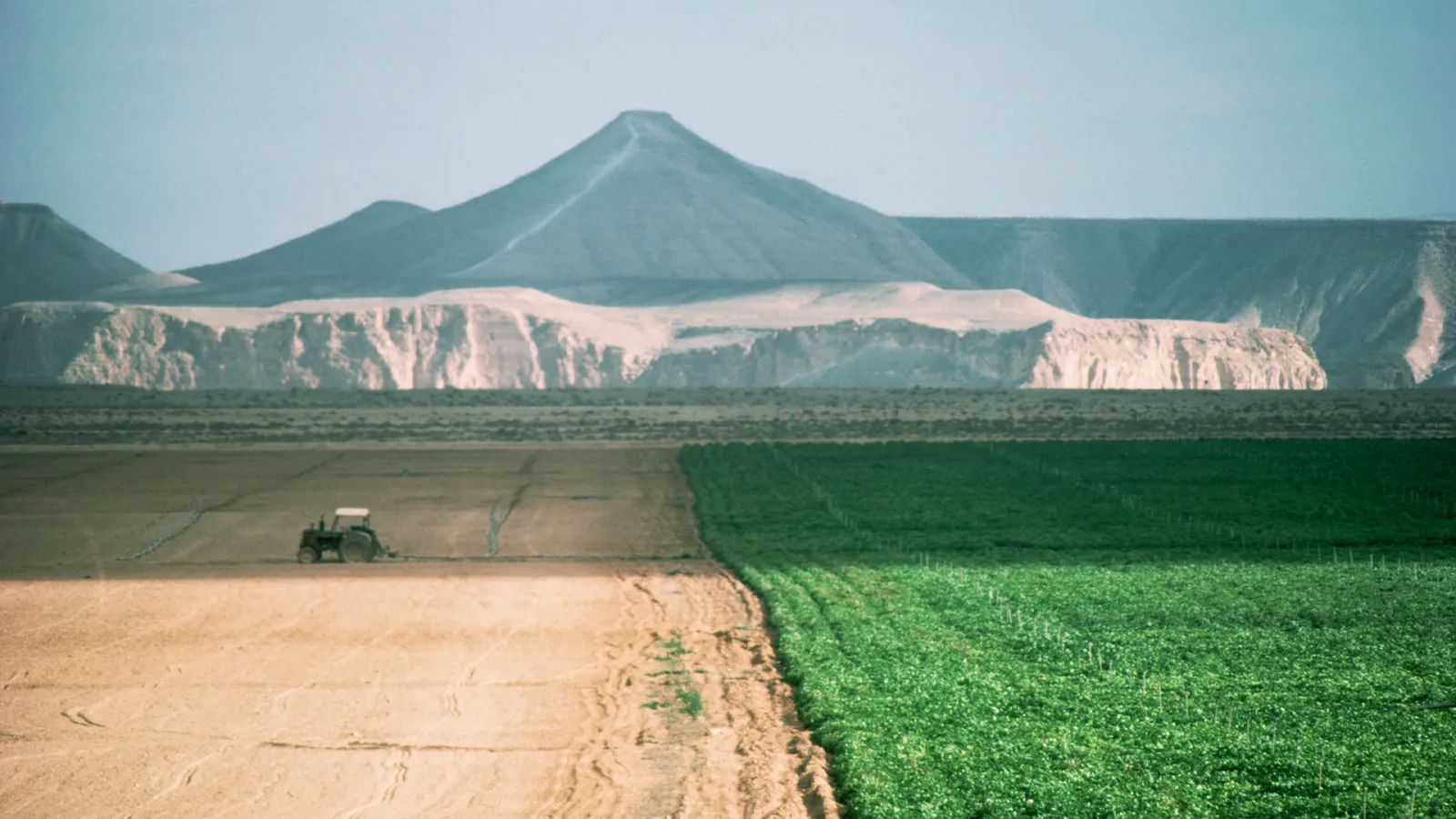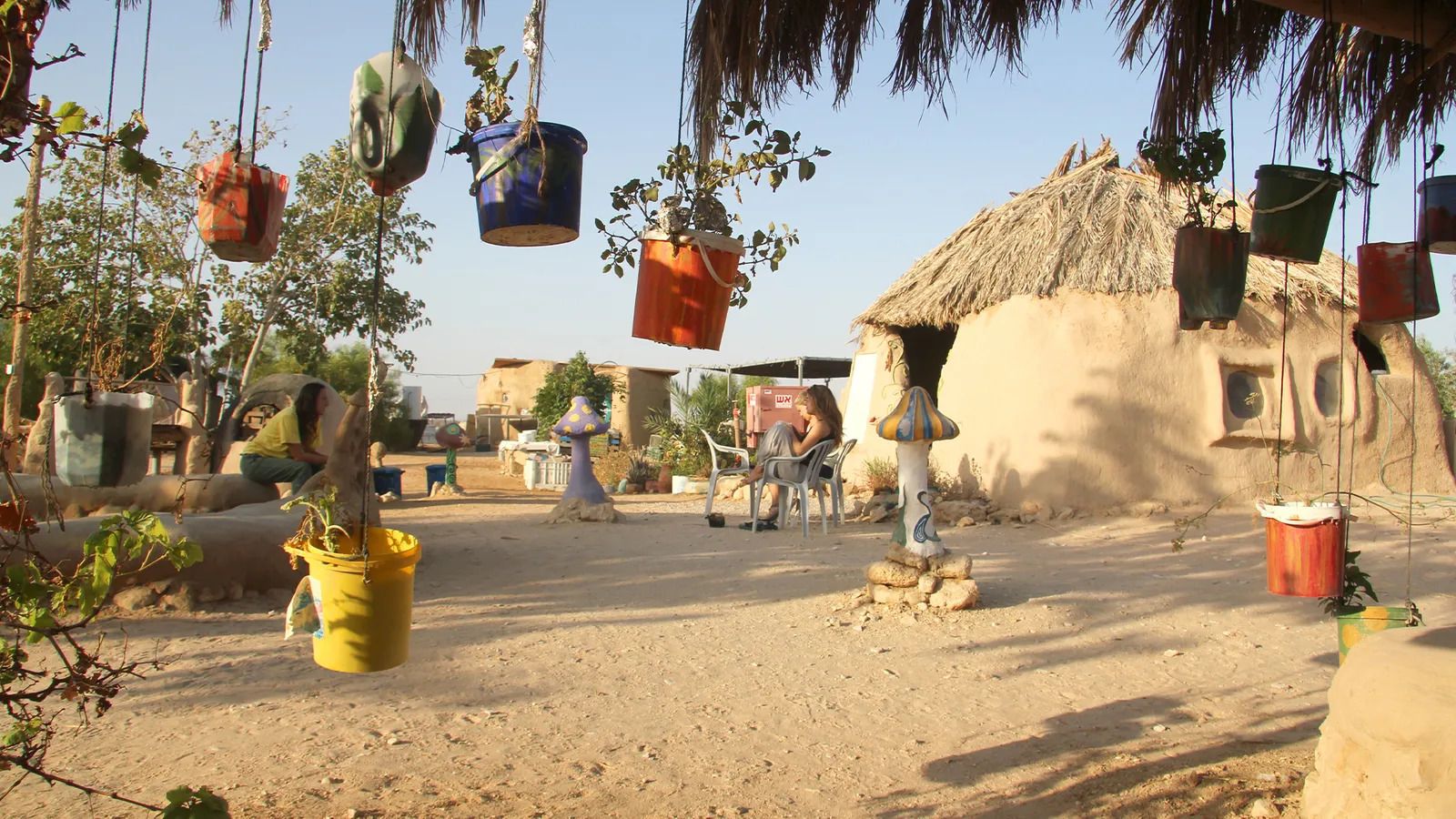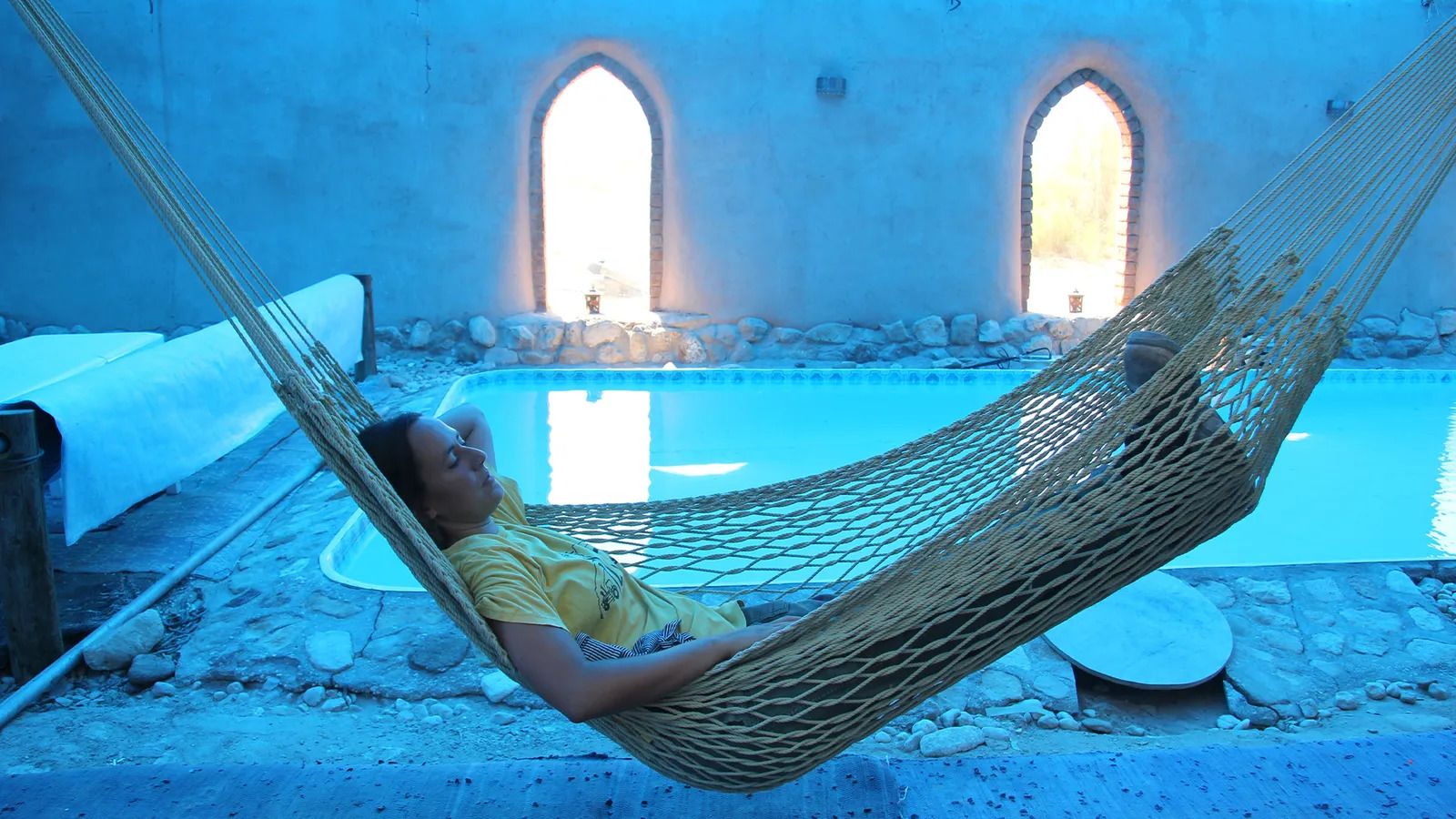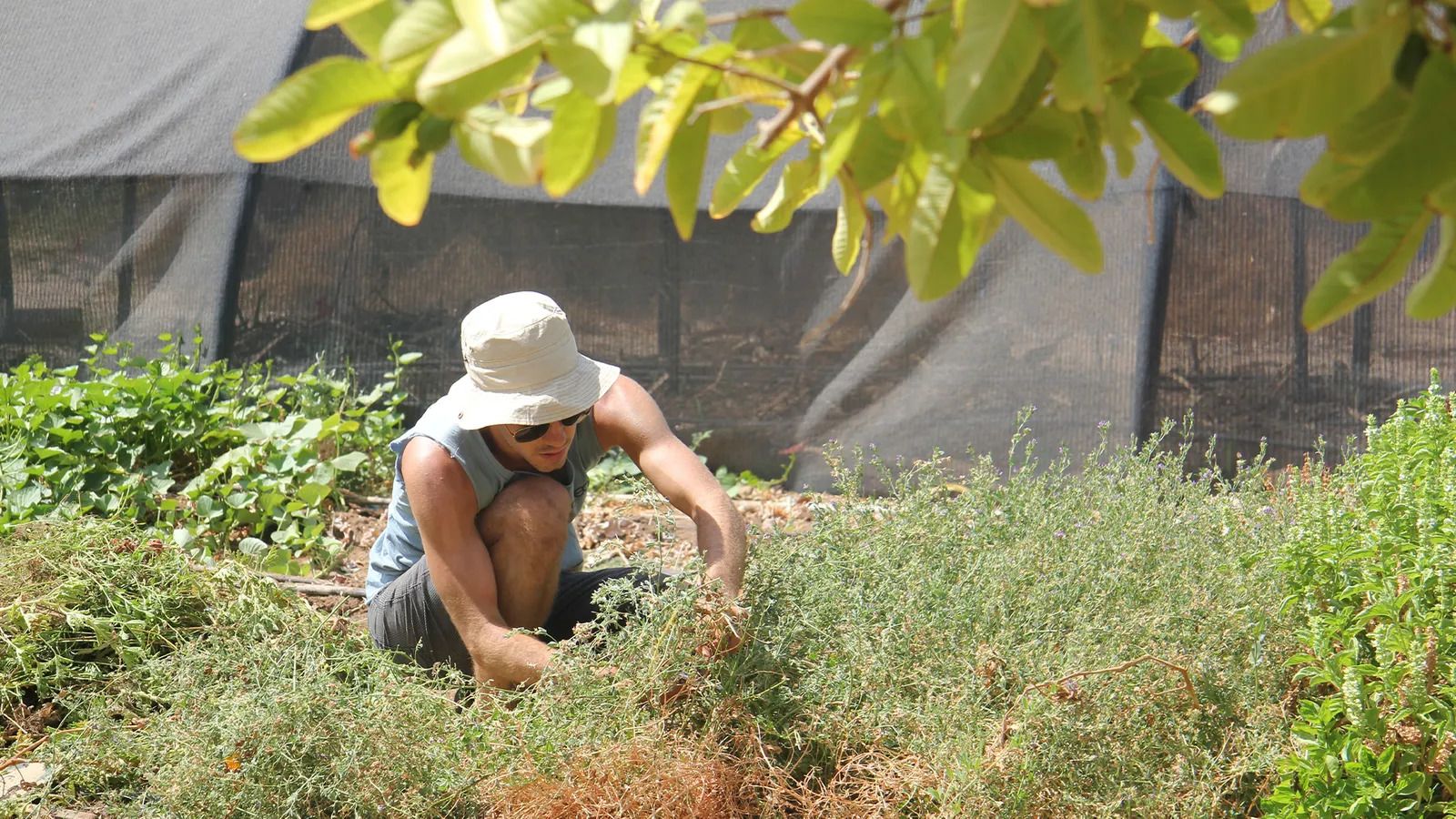
Israel's transformative desert retreat
My very first taste of Israel was as a teenage volunteer at a kibbutz, and after 25 years, I was returning to stay at the country's newest one: Kibbutz Lotan. These small, agrarian collectives (whose name means "gathering" in Hebrew) were founded at the start of the 20th Century as a communal, egalitarian way of living and working for Jewish immigrants and settlers. Today, there are around 270 such communities scattered around Israel.
The aims of the kibbutz system evolved over time, and it came to play a role in forming the boundaries of the new state of Israel. In the late 1930s, many of these communities were established in the Negev and other outlying desert areas to try to claim land that they hoped would be incorporated into a future Jewish state. After cultivating the once-infertile land, these communities also helped develop the nation's highly acclaimed agricultural industry through advances such as drip irrigation technology, which is now used globally since Israel pioneered it in the 1960s. From water conservation systems to innovations in pest control, the kibbutz movement has been at the helm of global agricultural technology.
Originally, all wealth and income generated from a kibbutz was shared among its members and profits were reinvested in the community. Today, roughly 75% of these collectives have moved to a more privatised model, allowing members more financial independence and the ability to work away from the kibbutz while still living there. Traditionally, meals were prepared and eaten communally, but now, more and more kibbutz members eat as families at home. Yet, all communal matters – such as building renovations or delegating funds for the children in the kibbutz to go to university – are still done in the traditional manner by voting, and jobs are assigned by rotation, choice or skill sets.
 Many kibbutz communities were established in the Negev and helped green the desert, such as Kibbutz Sde Boker
Many kibbutz communities were established in the Negev and helped green the desert, such as Kibbutz Sde Boker
But as times change, economic opportunities are luring many young families away from these rural collectives and into towns and cities. As a result, the kibbutz movement has been steadily shrinking since the 2000s. Yet, Kibbutz Lotan, which is a four-hour drive south of Jerusalem and Tel Aviv, has 200 residents and is growing. It has also found a new raison d'être. Set up in 1983, Lotan is the only kibbutz educating tourists about sustainable living, and in the process, it's changing how travellers experience Israeli culture and transforming people's relationships with food and the environment.
I discovered the kibbutz's bohemian "eco campus" years ago on social media. A series of sustainable, carbon-neutral mud domes offers a taste of communal living for visitors. Tourism is one of the three means of funding for the kibbutz, which also has a separate guest house, along with a dairy farm and extensive date orchards.
[The kibbutz] feels like a very beautiful window into Israeli life and culture
Travellers to Lotan understand their trip will not be the usual holiday, so with my working clothes in hand, I rolled up my sleeves. We worked from 06:00 until 11:00 Sunday to Thursday, learning skills from gardening to seed cutting. Anyone can drop in for as little as a few nights or participate in Lotan's month-long academic courses, where they learn skills such as solar cooking with a box oven and building functional objects from mud. They can also see how compost can be used to grow vegetables in the organic garden and fuel the two biogas systems in the kibbutz, a totally renewable source of energy.
The air-conditioned mud domes (made of a mixture of clay, sand, straw and water) use 60% less energy to heat and cool than other structures in the arid region. They are surrounded by the endless mountains in the distance, and at night, the sky becomes a myriad of stars. Everything around the eco campus is sustainable, from the waterless composting toilets to the solar-powered hot water showers, lighting and biogas-powered kitchen. The fruit and vegetables you eat are either grown on the small kibbutz farm or on nearby Israeli farms using Israeli methodologies and techniques – such as using brackish water from aquifers beneath the Negev – to grow a diverse array of crops from cherry tomatoes to avocados, more native to the Mediterranean than the Middle East.
 Visitors to Lotan stay in eco-friendly mud domes and help build structures from mud
Visitors to Lotan stay in eco-friendly mud domes and help build structures from mud
The drive from Israel's two biggest cities to Lotan is an experience in itself, taking you through the colourful and dramatic rocky desert landscape. I travelled 324km south from Tel Aviv to the kibbutz, past the winding mountain ranges and picturesque Dead Sea coast, a vivid panorama of blues, salt formations and sinkholes. The cratered, Martian-esque landscape was broken only by sporadic date plantations. Halfway on the four-hour drive, I stopped at one of the public beaches at the Dead Sea, Ein Bokek – the lowest point on Earth. As I entered the hot water and laid back, I felt weightless in the silky – almost oily-feeling – water that is nearly 10 times saltier than any ocean.
Once at Lotan, the work was hands on and dirty – the perfect way to reconnect with nature. My first day began with learning to plant and care for sweet potatoes. A group of three other tourists and I then planted vegetable seeds such as kale, chard and pak choi – all of which would later be enjoyed by the kibbutz's future arrivals. The programme lead, Mark Naveh, a soft-spoken man whose Hebrew revealed his Australian upbringing, later showed us how to build a new bench from mud for the eco campus.
During the five-hour working day, there was a one-hour break for breakfast, which usually consisted of eggs, salad and pita bread – a traditional Israeli breakfast sourced from the kibbutz. The rest of the day was free to enjoy the kibbutz pool or travel by bus to nearby attractions like Timna Park, which has popular hiking and biking trails, and where visitors can spot indigenous animals including oryx and ibex.
The kibbutz has also become famed among bird watchers. It's located on one of the world's most popular migratory routes, attracting around half a billion birds each year from more than 230 species between Europe, western Asia and Africa.
 Visitors to Lotan do things like organic farming and eco-friendly
architecture for five hours and then have the rest of the day to
themselves
Visitors to Lotan do things like organic farming and eco-friendly
architecture for five hours and then have the rest of the day to
themselves
While I was there, I met Lii Schacht, from Sweden, who was staying at Lotan for four days during her first trip to Israel. She said she wanted to explore the Negev and enjoyed working with Israelis as she participated in the eco programme. One evening, she and I were invited to share a traditional and intimate Shabbat meal in one of the kibbutz member's home. This Friday night ritual is at the heart of Jewish and Israeli culture and brings the family together to mark the start of the sabbath, from Friday at sunset until Saturday's sunset. Even for less-religious Israelis, the ritual – where candles are lit, bread is shared and wine glasses are raised – is a symbolic connection to roots and tradition.
"There is no way I could have experienced something like this by staying in a hotel in the city," Schacht said. "[The kibbutz] feels like a very beautiful window into Israeli life and culture, far different to the limited view of Israel that we see on the news."
Lara Cohen stayed at the kibbutz while spending several months travelling around Israel. After just one week, the university graduate said she felt confident enough to begin her own organic garden back in Australia. "For me, this has been a really authentic Israeli experience, as well as teaching me things I can implement in my life when I get home," she said.
Even the way the young vegan looks at food has changed. "So often we think about what we feel like eating rather than what we have to eat, which is why we waste so much. Here, I can see how people eat what they have and turn it into creative things with some effort rather than throwing things away."
 By teaching people to grow what they eat and reduce their waste, Lotan is helping change people's relationships with food
By teaching people to grow what they eat and reduce their waste, Lotan is helping change people's relationships with food
Naveh said that the kibbutz's short courses are a way to make real changes on an individual level at minimal cost. "Composting is something we can all do at home… There are many problems which require community and national or international action, but as individuals, we can grow a bit of food on our balcony or back garden and compost the food waste we have."
Jonathan Dekel-Chen is a historian on the kibbutz movement at The Hebrew University of Jerusalem and lives on a kibbutz himself. "Had Lotan tried this [eco-tourism] 30 years ago, it would have flopped. The world wasn't ready for it. But now, sustainability is the issue of a generation and it's a huge one in the human consciousness," he said.
"As far as sustainability goes, it makes sense to do this in the [Negev desert]. If there is one place in the country to show [human] adaptability to desert conditions and living sustainably, it would be that area," Dekel-Chen said. "Lotan has been able to offer this to the wider public."
As I left, driving along the winding Route 90 to Jerusalem, I contemplated this relic of old Israel in the rapidly advancing nation. At its core, a kibbutz has always been a conscious community that cherishes "we" over "I" – a notion that's more important now than ever.











